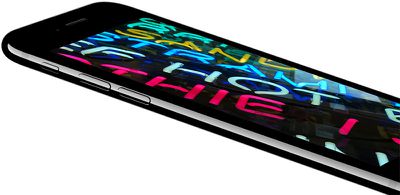Apple is widely expected to launch an iPhone with a 5.8-inch edge-to-edge OLED display later this year, made possible by slimmer bezels and no Home button. And while some reports have claimed the screen will be curved like the Galaxy S7 edge, a growing number of sources expect a flat display.

"We anticipate Apple will adopt a flat implementation of OLED design on their special iPhone model, which is analogous to the current 2.5D glass design," IHS Markit analyst Wayne Lam told MacRumors today.
"Much like the recently announced LG G6, we anticipate a touchscreen with a new longer aspect ratio design to take advantage of higher coverage area of the iPhone in its entirety. This new design language is expected to become the trend for 2017, as we all anticipate Samsung's reveal later this month," he added.
Lam is referring to the LG G6's 5.7-inch LCD display with a 2:1 aspect ratio, meaning the screen's length is double the size of its width. iPhones have a 16:9 aspect ratio. Leaked pictures of Samsung's Galaxy S8 reveal a similarly longer OLED display with slim bezels and no physical home button.
Last month, he noted that the LG G6 achieves a large screen while remaining holdable and pocketable:
LG’s G6 is a study in creating large immersive screen designs that do not break the ergonomic requirements of the average human hand. By addressing dueling consumer demands for larger screens but yet more pocketable device, LG took on the challenge of re-imagining what a modern smartphone should look like and function ergonomically.
While he ruled out having any insider information, display expert Raymond Soneira of DisplayMate told MacRumors that flat OLED displays using a glass substrate "cost considerably less" and are "available in much higher production volumes" than curved OLED displays using a flexible plastic substrate.
"The existing iPhone 7 has 2.5D cover glass with a flat glass LCD display, so Apple could make a similar 2.5D OLED display using a glass substrate OLED display at lower cost and much higher production volumes," he said.
Soneira has been tracking OLED displays in smartphones since 2010, and after a span of just seven years, he believes OLED display technology is now exceeding the performance of the best LCDs for smartphones.
He said OLED displays provide a number of significant advantages over LCDs for smartphones, including being thinner, lighter, and more power efficient for most image content. OLED displays also have a very fast response time, better viewing angles, higher peak brightness, and often better color accuracy.
KGI Securities analyst Ming-Chi Kuo and Chinese research firm TrendForce have also recently said they expect Apple's next flagship iPhone to have 2.5D cover glass, which refers to the slightly curved edges that the front of iPhones have had since the iPhone 6 and iPhone 6 Plus in 2014.
Conversely, The Wall Street Journal recently said Apple's next high-end iPhone will have a curved screen, but the report did not divulge any specific details. The Korea Herald also said the device will have a curved OLED display using a flexible plastic substrate, rather than a flat display based on glass.
IHS Markit analyst Kevin Wang previously expected the 5.8-inch iPhone to have a curved display, possibly with dual curved edges like the Galaxy S7 edge, but the research firm has since reversed course, which is understandable given Apple has reportedly tested at least ten different iPhone prototypes this year.
Japanese website Nikkei Asian Review and Barclays analysts have also outlined expectations for an iPhone with a curved display in the past, so there is clearly a divide between the rumors that might not clear up until "iPhone 8" part leaks likely begin to surface over the coming weeks and months.
One possibility is that reports calling for a "curved" screen are actually referring to the 2.5D cover glass, which would make an edge-to-edge display appear slightly curved. Or, given the flexible properties of OLED, some reports might be simply assuming the next iPhone will have a curved display, when a flat design is still an option.
Samsung is expected to supply Apple with OLED displays in 2017. IHS Markit and other sources expect Apple to use OLED on a larger number of iPhone models in the future. IHS noted the longer aspect ratio will afford Apple new uses of the display, such as Touch Bar-like functionality.























